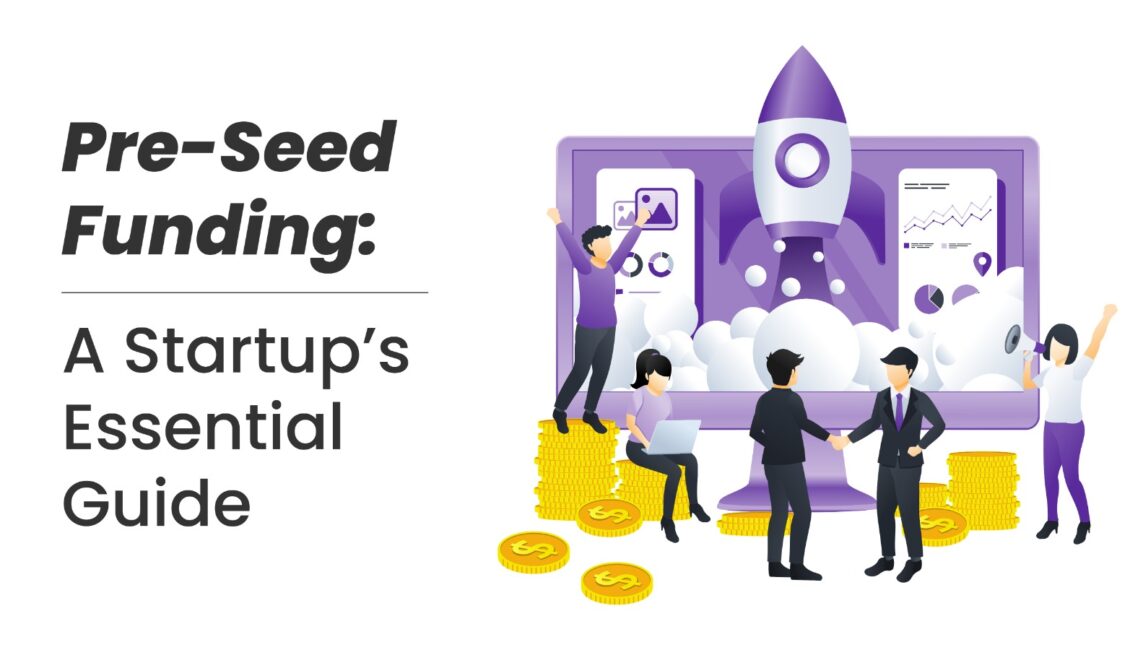
A startup’s journey begins with an innovative idea. However, a startup needs capital to keep it running. Acquiring that capital requires proof of concept, research, and production. You’ll also have to nurture the idea to strengthen the roots of your startup. Therefore, pre-seed funding for startups is essential for their growth. In this blog, we will discuss the importance of pre-seed funding, its sources, the process, and some pre-seed funding tips.
What is pre-seed funding for startups
Finance is crucial throughout the early stages of a startup’s development to turn a concept into a viable business; otherwise, it may fail to take off. Pre-seed financing for startups is used to provide support for research and development of a tangible product/service in order to turn an idea into a viable business.
The pre-seed funding for startups covers the cost of conducting market research, creating an MVP, recruiting a skilled team, and testing their target market for traction. It lays a strong foundation for the startup for future performance and funding.
Sources of pre-seed funding for startups
The pre-seed funding is raised by startups in their initial stages, often needing a solid business model or market traction. Therefore, it is a risky investment that many might not be willing to make.
Therefore, most startups begin their journey with bootstrapping and investing their personal funds. However, there are many risks associated with the method. Thus, startups’ second most common starting point is to raise pre-seed funding. The following are the most common sources for raising pre-seed funding in India:
-
Family and friends
Your friends and family can provide you with those initial funds. However, the key is to treat them like any other professional source to maintain the structure and relationships for a long time. You can do the basic research and tell them about it to raise capital to kickstart your journey.
-
Angel investors
Angel investors, just like their name, are a blessing for raising pre-seed funding. Angel investors are the risk takers, investing in pre-seed stage startups to support their growth. Pre-seed capital offered by angel investors comes with unwavering support and mentorship, helping you tackle any situation your startup may face.
-
Incubators
In the initial stage, startups often need guidance to handle business. That’s where startup incubators come into the game. Startup incubators are official organizations supporting startups in their initial stages to familiarize themselves with the startup ecosystem. This organization also provides fundraising opportunities and builds the startup’s brand image.
-
Government grants
The government focuses on creating a supportive environment for startups to thrive and grow. Government grants are one such initiative that offers free funding and support to startups. Initiatives like the Startup India Seed Fund Scheme (SISFS) provide non-dilutive funding to early-stage startups in India, making it an excellent option for founders looking for resources without giving up equity.
-
Startup competitions
The startup competitions for pre-seed startups are the perfect opportunity to validate their idea and gain market insights. You get networking opportunities, secure funds, and gain insights for product enhancement and future funding.
-
Crowdfunding
Startups use crowdfunding to present their ideas to a broad audience, raising small amounts from many contributors.
What is the pre-seed funding process?
Are you wondering how to raise pre-seed funding? We are here to help you with that. We have put together a few tips and tricks for the pre-seed funding process that will help you secure the funds and kickstart your journey:
1. Creating a business plan
This might seem like contradicting a line we said earlier. Yes, pre-seed funding is for the startups in the ideation or initial stage. However, to raise funds, you must tell the investor your vision, market demand, and plan to achieve the desired goals.
It helps investors understand your startup and its projections, allowing them to determine whether or not it will be successful and the possible returns they will get from investing in your idea. So, develop a business plan that includes your business strategy, market research, and potential traction and sales.
2. Crafting an engaging pitch
Once you have a business plan, you must master the art of presenting the plan efficiently to garner interest. Create an engaging story to build up why your startup is needed and what the potential of your startup is.
3. Pitch your startup idea
Write a hook to attract the investor’s attention and keep them engaged through your pitch. You can practice your pitch at networking events like 21BY72’s startup summit to build your network and refine your pitch for improvement.
4. Negotiate the funding deal
The pre-seed funding is an equity-based investment. Therefore, be prepared to discuss valuation, equity, and other terms with potential investors. Transparency and authentic valuation and claims can go a long way in securing the funds.
Helpful pre-seed funding tips for startups
Pre-seed funding is a risky investment. Therefore, you’ll need pre-seed funding strategies to secure the funds and build your brand image for future investments. We have listed some pre-seed funding tips for startups:
-
Networking is crucial!
Networking is the key to any business’s success; startups are the same! Moreover, networking can change the growth trajectory of the startup. When you attend networking events like the Global Startup Summit, you get exposed to industry and industry people like entrepreneurs, investors, industry experts, and mentors to help a startup grow. So, make sure to take advantage of such events!
-
Research for investors well
Investors can launch startups to stardom with their insights and industry knowledge. Thus, understand potential investors’ interests and investment patterns to craft compelling pitches that resonate with them.
-
Focus on market research
Investors are attracted to those who know their and the market’s status. Therefore, thoroughly research your market and target audience to create a reliable business model and growth strategy to attract investors.
-
Set ideal funding goals
Determine how much capital you need to achieve your milestones without overcommitting equity in the early stage. It helps you avoid overestimating valuation and raise necessary pre-seed funding. Furthermore, adequate fundraising enables you to avoid the pressure of performance from the investors.
-
Practice your pitch
Rehearse with mentors or colleagues to refine your delivery and anticipate questions. A polished pitch can make all the difference when securing pre-seed capital.
Conclusion
A startup needs funds to kick start its journey and build. That’s why pre-seed funding is essential for startups. It helps the entrepreneurs convert their idea into a tangible business with a reliable business model and product/service. Pre-seed funding for startups can be raised from friends and family, angel investors, incubators, government grants, or startup competitions.
You must create a compelling pitch to present your vision and the startup potential in the target market. Avoid raising too much funds initially by diluting the equity from the get-go. Attending startup events like the one organized by 21BY72 can help you practice your pitch and connect with potential investors and business partners.
FAQs
1. What are the benefits of pre-seed funding for startups?
Pre-seed funding provides the capital to cover early-stage expenses like research, developing prototypes, and hiring skilled staff. It also allows startups to validate their idea, attract early customers, and set the stage for future funding rounds. Pre-seed capital nurtures the startup and lays the foundation for the startups to build their products and grow. The startup can kick start its journey and establish a market presence by raising pre-seed funding.
2. What’s the difference between seed funding and pre-seed capital?
Although the pre-seed and seed stages of a startup are close by, there are a few differences. Pre-seed funding is the earliest stage, often from personal networks or small investors, focusing on idea validation and prototyping. On the other hand, seed funding is used to scale operations, market, and expand the team. While both fundings are risky, the pre-seed funding is more risky, and only a few investors are willing to take the risk.
3. When should I raise pre-seed funding?
The timing is crucial in any fundraising stage. However, it is critical in the pre-seed stage. The future of your innovative idea relies on pre-seed capital. You should seek pre-seed funding when you have a clear business idea, an initial plan, and a strategy for using the funds. This is usually before significant traction or revenue is established. Having this data at hand can help you secure funding from the investors. You can attend pitching events like the Global Startup Summit to gain exposure to the startup world, including investors.
4. How to raise pre-seed funding?
Raising pre-seed funding may seem intimidating, but following some steps is simple. There are a few things you need to do to raise pre-seed funding:
- Develop a solid business plan.
- Network with potential investors and mentors.
- Create an engaging pitch deck.
Apply to incubators, competitions, or crowdfunding platforms.








